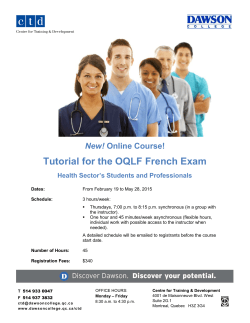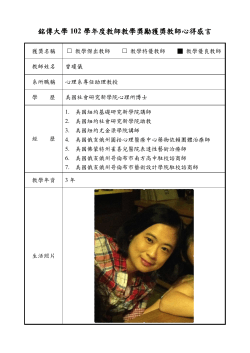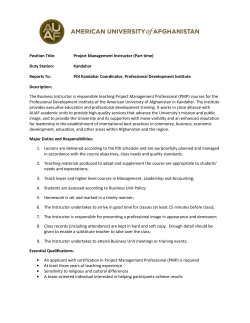
School of University Arts and Sciences PEAC 216
School of University Arts and Sciences Peace Studies Program PEAC 216 The Doukhobors COURSE OUTLINE Spring/Summer 2015 Instructor Office Phone Email Takaia Larsen O-023 250.365.1358 tlarsen@selkirk.ca Hours/Week April 20 – April 26 Online Readings and Discussion Forum April 27 – May 1 Monday to Friday 0900-1630 Mir Centre, Castlegar May 3 – May 8 Written Assignment Credits 3 Course Description PEAC 216: The Doukhobors offers an interdisciplinary approach to the study of the Doukhobors and their ongoing connection to issues of peace and conflict. Drawing on a variety of perspectives, this course analyzes the Doukhobor experience in light of what social scientists refer to as a social movement. Rooted in the religious turmoil of early modern Europe, that experience has situated this group within some of the most important political, economic, social, and identity-based tensions of the past 200 years. From this perspective, we assess how the Doukhobors reflect an ongoing effort to negotiate an alternative vision of modernity, that process of transformation that is expressed in forms including secularism, liberalism, the rise of the individual, the proliferation of capitalism, the growth of the modern state, and increasingly destructive technologies of war. Teaching Methodology Each class will normally include lecture and discussion, guest speakers and off site excursions/field trips. The final day of classes will consist of student presentations on their research topics. Classes will be interactive, making pre-reading and preparation for presentations integral to discussions. Students will be given pre-reading assignments prior to the beginning of the course, complete an in-class reflection paper on the first day and a follow-up in class written assignment on the last face-to-face day, as well as a formal written assignment that will be completed after the classroom time is completed. Prerequisites Grade 12 English with a grade of “C” or better. PEAC 100 is recommended but not required. Learning Outcomes Upon successful completion of this course, students will be able to: utilize historical context in order to understand Doukhobor culture, religion and practice in a framework of peace and justice. PEAC‐216‐spr‐s15‐TL Instructor(s): Takaia Larson Semester/Year: Spring/Summer 2015 Course: Page: PEAC 216 2 synthesize key concepts of Peace Studies (such as peace, nonviolence, justice, conflict resolution, civil disobedience) as they relate to Doukhobor history and present day realities. identify key contributions of the Doukhobor Community to the broader peace movement in Canada and globally. Textbooks/Supplemental Materials The following is a possible list of reading material: Required and recommended readings for this course will be accessible through the Peace 216 Moodle Page. Evaluation Major Paper ................................................................................................................... Reflection of readings (2 x 15% each) ............................................................................ Discussion Forum Participation ..................................................................................... Student Presentations………………………………………………………………………... TOTAL ........................................................................................................................ 40% 30% 10% 20% 100% Grading Letter grades of C- to A+, P (pass), and F (fail) will be used. "I" (incomplete) may be temporarily given to the student who is unable to complete course assignments by the end of the semester because of illness or another valid reason, but only after consultation with the instructor. A "W" (withdraw) can be obtained by withdrawing from the course before the College deadline for withdrawals. Percentage Letter GPA Grade Description A+ 4.0 90-94 A 4.0 85-89 A- 3.67 80-84 B+ 3.33 75-79 B 3.0 70-74 B- 2.67 65-69 C+ 2.33 60-64 C 2 55-59 C- 1.67 50-54 P 1.00 0-49 F 0.0 FAILURE. Student has failed to master enough of the prescribed learning outcomes to receive any credit for the course. DNW 0.0 DID NOT OFFICIALLY WITHDRAW FROM COURSE. Students who did not complete a course and who, at the time they ceased to participate, had not 95-100 PEAC‐216‐spr‐s15‐TL EXCELLENT. Work of exceptional quality; content complete, accurate and at a high level; excellent mastery of course learning outcome. GOOD. Good quality work with no major weaknesses; mastery of most of the learning outcomes. SATISFACTORY. Adequate work; some weaknesses in mastery of course learning outcomes; important details, skills or perspectives are left out. This level of achievement is normally considered satisfactory for the student to proceed to further courses in the same subject. UNSATISFACTORY. Minimally adequate work which may not prepare students for further study in the same or related subject areas. This grade may not meet the prerequisite grade requirements of subsequent courses. Instructor(s): Takaia Larson Semester/Year: Spring/Summer 2015 Course: Page: PEAC 216 2 accumulated sufficient marks to achieve any of the above passing grades. Additional Relevant Information/Course Expectations 1. Attendance According to College policy 3400, students are expected to attend all classes. In the event of a missed class due to illness, students are responsible for the material covered and work assigned during class. 2. Participation Active participation in class activities is required. Assigned readings must be completed before they are covered in class. Students are expected to conduct themselves in a professional, respectful manner, in accordance with School and College policies. Students are also expected to engage in class and online discussions showing respect for the opinions of others. 3. Assignments Assignments must be handed in or presented on time, unless prior arrangements are made with the instructor. All late assignments will be subject to penalty: 10 percent per day. Extensions will be considered, but arrangements must be made prior to due date. Extension requests will normally not be considered the day before a due date, except in extreme conditions, such as documented medical condition etc. 4. Plagiarism Plagiarism is the representation of another’s work as one’s own and is a serious offence. (See College policy 8618) All finished work must be the student’s own. Instructors will only communicate to students through their Selkirk College email accounts. Students are required to access their Selkirk email accounts to stay in communication with their instructor. Information about student email accounts can be found on the College website at http://selkirk.ca/services/campus-services/it-services 5. Relevant Policies Students should be aware of their rights and responsibilities as described in the following Selkirk College policies (http://policies.selkirk.ca/): Admissions and Standards Overview http://policies.selkirk.ca/policy/8610/ Student Code of Conduct http://policies.selkirk.ca/policy/3400/ Student Appeals http://policies.selkirk.ca/policy/8400/ In addition, students are subject to the program policies for their specific program http://policies.selkirk.ca/program In addition, students are subject to the program policies for their specific program (http://policies.selkirk.ca/program). Course Change Information contained in this course outline is correct at the time of publication. Content of the course is revised on an ongoing basis to ensure relevance to changing educational, employment and market needs. The instructor will endeavor to provide notice of changes to students as soon as possible. The instructor reserves the right to add or delete material from courses. PEAC‐216‐spr‐s15‐TL Instructor(s): Takaia Larson Semester/Year: Spring/Summer 2015 Course: Page: PEAC 216 2 Course Schedule Day 1 – Monday, April 27 (9:00-4:30 MIR Center) In class written assignment #1 – Reflection on Readings and Discussions Thus Far Circle Exercise Lecture 1: Course Introduction: Assignments and Expectations Lecture 2: Doukhobour Origins and History in Russia Movements and Modernity: Building an Analytical Toolbox Lecture 3: Immigration to Canada Guest Speaker Field Trip: Doukhobour Discovery Center Day 2 – Tuesday, April 28 (9:00-4:30 MIR Center) Lecture 4: Saskatchewan: Broken Promises and Community Fracture Lecture 5: The Valley of Consolation: Migration to the West Kootenays Lecture 6: Toil and a Peaceful Life: Agriculture and Industry Guest Speaker Field Trip: Brilliant Cultural Center (Borscht making) Day 3 – Wednesday, April 29 (9:00-4:30 MIR Center) Lecture 7: Community Divided: The Moderates and the Sons of Freedom Lecture 8: The “Doukhobor Problem” and the Canadian State: Education, Resistance and Revolt Lecture 9: Implications and Significance Guest Speaker Field Trip: Zuckerberg Island and Castlegar Primary (Russian Bi-lingual Classroom) Day 4 – Thursday, April 30 (9:00-4:30 MIR Center) Lecture 10: The Doukhobors and the Peace Movement Lecture 11: Reconciliation, Assimilation, and the ‘Long Tradition’: Doukhobor Contributions to Community, Politics, and Identity in the West Kootenays Guest Speaker Field Trip: Doukhobour Suspension Bridge and Verigin’s Tomb Day 5 – Friday, May 1st (9:00-4:30 MIR Center) In class written assignment #2– Secondary Reflection on initial reflections as well as learning from the week Student Presentations Guest Speaker Field Trip: Walking through the Past – MIR grounds, Brilliant Benches, Waldie Trail, Doukhobour Waterline…. 15 03 09 / TL:lp PEAC‐216‐spr‐s15‐TL
© Copyright 2025










